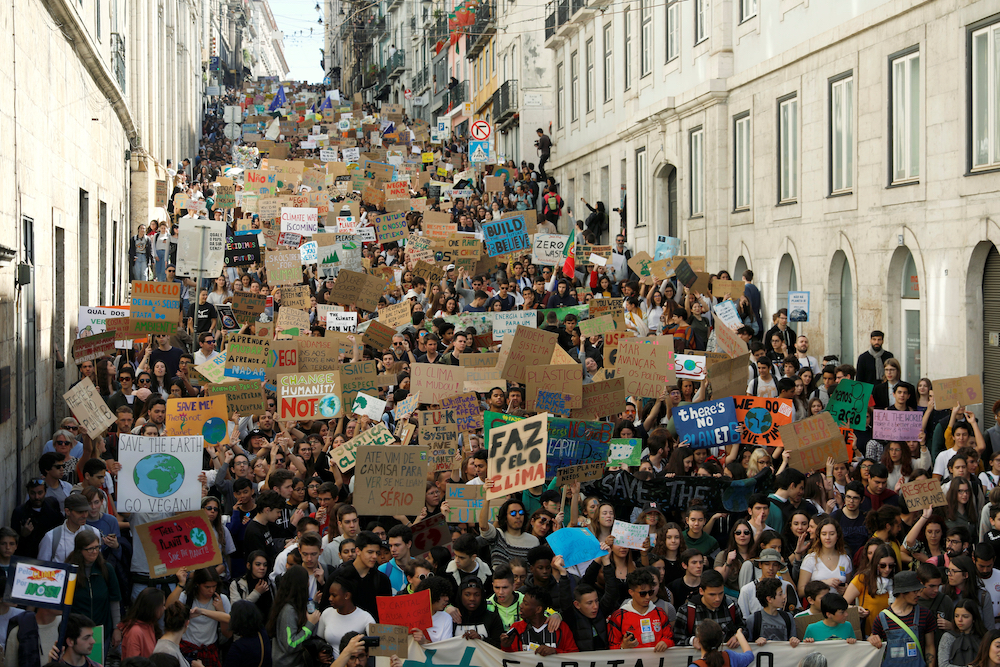
Students in Lisbon, Portugal, protest March 15 to demand action on climate change. Students from around the world participated in the strike. (CNS/Reuters/Rafael Marchante)
Leading international climate advocates in the Catholic Church stressed the need for urgency — as well as hope — to effectively organize to combat climate change at a March 15 conference on fossil fuel divestment in Washington, D.C.
On the same day that thousands of students around the world participated in the global Youth Climate Strikes to protest inaction on climate legislation, three Catholics prominent in climate action efforts spoke about the importance of divesting from fossil fuels as part of the Catholic Divestment" conference sponsored by the Global Catholic Climate Movement.
Each speaker focused on the moral, financial and real-life impacts of Catholic organizations divesting from fossil fuels: removing from financial portfolios investments in corporations that profit off the burning of fossil fuels that contribute to climate change.
So far, more than 120 Catholic organizations have announced their intention to cut fossil fuels from their portfolios, including Caritas Internationalis and the bishops' conferences of Ireland and Belgium. A program from the Global Catholic Climate Movement has helped drive many of the Catholic divestment decisions, while numerous organizations have cited Pope Francis' encyclical "Laudato Si', on Care for Our Common Home" as inspiring them to act.
"The challenge is fossil fuels are underpinned by an entire economic system," said Lorna Gold, coordinator for the Laudato Si' Project with Trócaire, the Irish bishops' agency for international development that has also divested from fossil fuels.
In her 20-minute presentation, Gold spoke about the importance of a Catholic moral voice in the climate activist movement. She began by using the word "urgency" to describe the current situation on the planet, saying that if global temperatures rise above 1.5 degrees Celsius (2.7 degrees Fahrenheit) there will be "catastrophic changes." She noted that we are currently on track for a 3- or 4-degree C increase by the end of the century.
Gold emphasized that young people, in particular, understand the present climate reality and are taking much-needed leadership in addressing the crisis, with the global climate strikes being evidence of that. She also stressed the importance of Laudato Si' in "filling a vacuum" and "providing an integral message" for Catholic social teaching that calls the church "to reap the signs of the time" and take action.
Gold, noting Catholic social teaching that stresses that all financial choices matter, said that it would be "unfathomable for Catholics to invest in abortion," and so that "same logic should be applied to investments that contribute to the destruction of the planet."
John O'Shaughnessy, the CEO and CFO for the Franciscan Sisters of Mary who have divested from fossil fuels under his leadership, presented on the financial case for why organizations should divest.
He argued that the fossil fuel industry as a whole is on the decline despite its current size and influence. He cited a drop in stock prices for energy companies in the past five years, the growing demand for clean energy and the reduction of the energy sector from making up 15 percent of the stock market a decade ago compared to just 6 percent today.
"Do you think what's been happening in the past 5 years — is there any reason to think it's going to vary from this moving forward?" said O'Shaughnessy. "From my perspective, it's hard to see what would drive up performance in that market."
Advertisement
Yeb Sano, the executive director for Greenpeace Southeast Asia and former lead climate negotiator for the Philippines at the United Nations, joined the conference via video from his home in the Philippines to discuss the real-life impacts of climate change in poorer communities around the world.
"The climate crisis is a crisis," Sano said. "People need to understand this is a matter of life and death for many people."
In 2013, Sano rose to notoriety when he tearfully pleaded for an agreement to reduce greenhouse gas emissions at U.N. climate talks in Warsaw, Poland, after super Typhoon Haiyan devastated his home country. In 2015, Sano stepped down from his position as a commissioner of the Philippines' Climate Change Commission to work with climate activists.
Sano compared the current climate movement to that of abolitionists in the 19th century.
"We must remain filled with hope," he told listeners at the divestment conference. "Corporations will feel the collective indignation of youth around the world. These battles will not be won or lost in boardrooms; these battles will be won or lost in grassroots."
In the afternoon, conference participants had the option to participate in workshops to discuss best practices for effectively pushing for divestment from different types of organizations, including universities, religious orders, dioceses and bishops' conferences.
[Jesse Remedios is an NCR Bertelsen intern. His email address is jremedios@ncronline.org.]








